Overview
The article titled "7 Key Insights on BAA Business for Healthcare Providers" highlights the vital role of Business Associate Agreements (BAAs) in the healthcare sector. It recognizes the emotional challenges healthcare providers face, particularly regarding compliance and patient trust. BAAs are essential for ensuring compliance with HIPAA regulations, protecting patient information, and fostering trust between healthcare providers and patients. They clearly outline the responsibilities of business associates in managing protected health information (PHI), helping to alleviate the administrative burdens that can impact patient care.
In an era where data breaches pose significant risks, understanding the importance of BAAs becomes even more crucial. By implementing these agreements, healthcare providers can effectively mitigate risks associated with data breaches, ultimately safeguarding the sensitive information of their patients. This proactive approach not only protects patient data but also reinforces the trust that is so fundamental in healthcare relationships.
As you navigate the complexities of healthcare compliance, consider how BAAs can serve as a cornerstone in your efforts to provide compassionate care. Reflect on the benefits they bring—not just in terms of legal compliance, but also in enhancing the overall patient experience. By prioritizing BAAs, you are taking a significant step toward fostering a secure and trusting environment for your patients.
Engaging with BAAs is not merely a regulatory obligation; it is an opportunity to demonstrate your commitment to patient care. I encourage you to explore how these agreements can support your practice and protect your patients. Together, let’s ensure that the healthcare environment remains a safe haven for those we serve.
Introduction
In the ever-changing world of healthcare, the integration of technology alongside ethical practices is more important than ever. Healthcare providers often face the emotional challenge of balancing operational efficiency with the need for compassionate patient care. Business Associate Agreements (BAAs) stand out as a vital element of compliance and trust in this complex landscape. These agreements not only protect sensitive health information but also play a crucial role in building patient confidence, especially in a time when data breaches are all too common.
With the stakes at an all-time high, it's essential for healthcare providers to grasp the nuances of BAAs. Understanding their key components and the potential consequences of non-compliance is crucial. This knowledge empowers providers to navigate the complexities of patient care while safeguarding sensitive information. This article explores the multifaceted world of BAAs, highlighting best practices, the significance of training, and the pivotal role technology plays in ensuring compliance and enhancing patient outcomes.
By engaging with this content, you can gain valuable insights that not only support your understanding but also foster a more secure environment for your patients. Let’s delve deeper into how BAAs can be a cornerstone of trust in your practice.
CosmaNeura: Transforming Healthcare Administration with AI Solutions
At CosmaNeura, we understand the emotional challenges faced by primary care practitioners who uphold Christian values. Our innovative Agentic AI platform is designed to alleviate the burdens of medical administration, allowing you to focus on what truly matters—delivering . By automating essential tasks like appointment scheduling, medical record management, and billing optimization, we empower you to enhance your practice while aligning with ethical medical practices grounded in Catholic teachings.
Did you know that 58% of medical executives plan to implement or acquire generative AI solutions in the coming year? This trend highlights the growing recognition of AI's role in improving operational efficiency. However, it is vital for platforms like CosmaNeura to prioritize both efficiency and ethical accountability. Our dedication to ethical practices ensures that our AI solutions address accuracy in medical diagnoses, reinforcing the trustworthiness of our technology.
While AI can significantly improve efficiency, we must not overlook the importance of the human aspect in medicine. As noted by Spectral AI, 43% of individuals prefer human interaction and touch. This statistic underscores the need to balance AI capabilities with compassionate care. By setting a standard in the billion-dollar faith-centered medical market, CosmaNeura is transforming how care facilitators operate, enhancing the quality of assistance for patients, and embodying the compassionate spirit of .
For medical facilitators considering the integration of AI solutions, adopting platforms like CosmaNeura can lead to substantial benefits, including time efficiency and revenue growth. Imagine utilizing AI technology to streamline administrative processes, allowing you to concentrate more on patient care and ultimately improve patient outcomes. Now is the time to explore how AI can transform your practice and elevate the quality of care you provide.
Understanding Business Associate Agreements: A Fundamental Requirement for Healthcare Providers
Business Associate Agreements (BAAs) are not merely contracts; they are essential baa business tools that define the responsibilities of business associates in managing protected health information (PHI). For healthcare providers, these agreements are essential for ensuring compliance with HIPAA regulations and safeguarding patient confidentiality. As Steve Alder highlights, "Before any PHI is disclosed to a HIPAA business associate, upstream covered entities must enter into a HIPAA Business Associate Agreement with the business associate." By clearly outlining how PHI can be used and shared, BAAs help reduce the risks associated with data breaches, which are alarmingly on the rise. Did you know there was a staggering 450% increase in Right of Access fines from 2019 to 2022? This underscores the critical need for strict adherence to regulations.
The importance of baa business goes beyond mere compliance; it is fundamental in fostering patient trust. A recent case study revealed that strong BAAs not only protect PHI but also enhance the reputation of medical organizations. This is vital for attracting and retaining patients in a competitive landscape. Patients expect their caregivers to protect their personal health information, and robust BAAs are key to meeting these expectations.
As we approach 2025, the adherence rates among medical practitioners to HIPAA regulations within the baa business remain concerning. More penalties were imposed in 2021 and 2022 than in any previous years. This situation highlights the urgency for healthcare professionals in the baa business to address these compliance issues effectively. How can automation through AI solutions help? By streamlining routine tasks, medical professionals can focus on strategic aspects of data security and regulations, further emphasizing the need for effective BAAs.
In addition to building trust, BAAs can significantly enhance operational efficiency. For example, a case study on cancer practices showed that using AI to capture after-hours interactions led to a reduction in claim denials and improved documentation processes. This not only boosted operational efficiency but also ensured that patient information remained secure, showcasing the integral role of BAAs in these positive outcomes.
In summary, are crucial for healthcare professionals. They serve as a foundation for compliance, foster patient trust, and enhance operational effectiveness in an increasingly complex regulatory environment. Let’s take action together to ensure that we uphold these standards and protect our patients.
HIPAA Compliance: Legal Obligations for Healthcare Providers Regarding BAAs
Healthcare practitioners often face significant emotional challenges when navigating the complexities of compliance. The administrative burdens associated with [creating baa business agreements](https://dialoghealth.com/post/hipaa-compliance-statistics) can feel overwhelming, especially since these agreements are essential for protecting Protected Health Information (PHI). As mandated by HIPAA, these agreements must clearly outline how PHI is used and disclosed, along with the safeguards necessary to protect this sensitive data.
The stakes are high; non-compliance with HIPAA can lead to severe penalties, including hefty fines and reputational damage. Did you know that in 2022, there were approximately two reported data breaches involving 500 or more records every day? This alarming statistic, nearly double the rate from 2018, underscores the critical need for providers to fully understand and comply with their legal obligations.
Moreover, consider this: 22% of all medical cybersecurity incidents stem from insider threats. This reality emphasizes the necessity of strong adherence to security measures within the context of baa business. Current trends reveal that 1 out of 7 entities lack a specific Officer for oversight, complicating adherence to HIPAA regulations. This highlights the importance of having dedicated personnel to manage regulatory efforts effectively.
For instance, Dialog Health serves as a beacon of best practices with . This platform not only ensures secure communication but also enhances engagement, fostering a supportive environment. Additionally, resources like UpGuard can assist medical organizations in achieving HIPAA compliance and managing their security stances effectively.
As we approach 2025, understanding the evolving landscape of HIPAA regulations is vital. By prioritizing these changes, healthcare providers can reduce risks and maintain the integrity of patient information. Let’s work together to navigate these challenges and ensure a safer, more compliant healthcare environment.
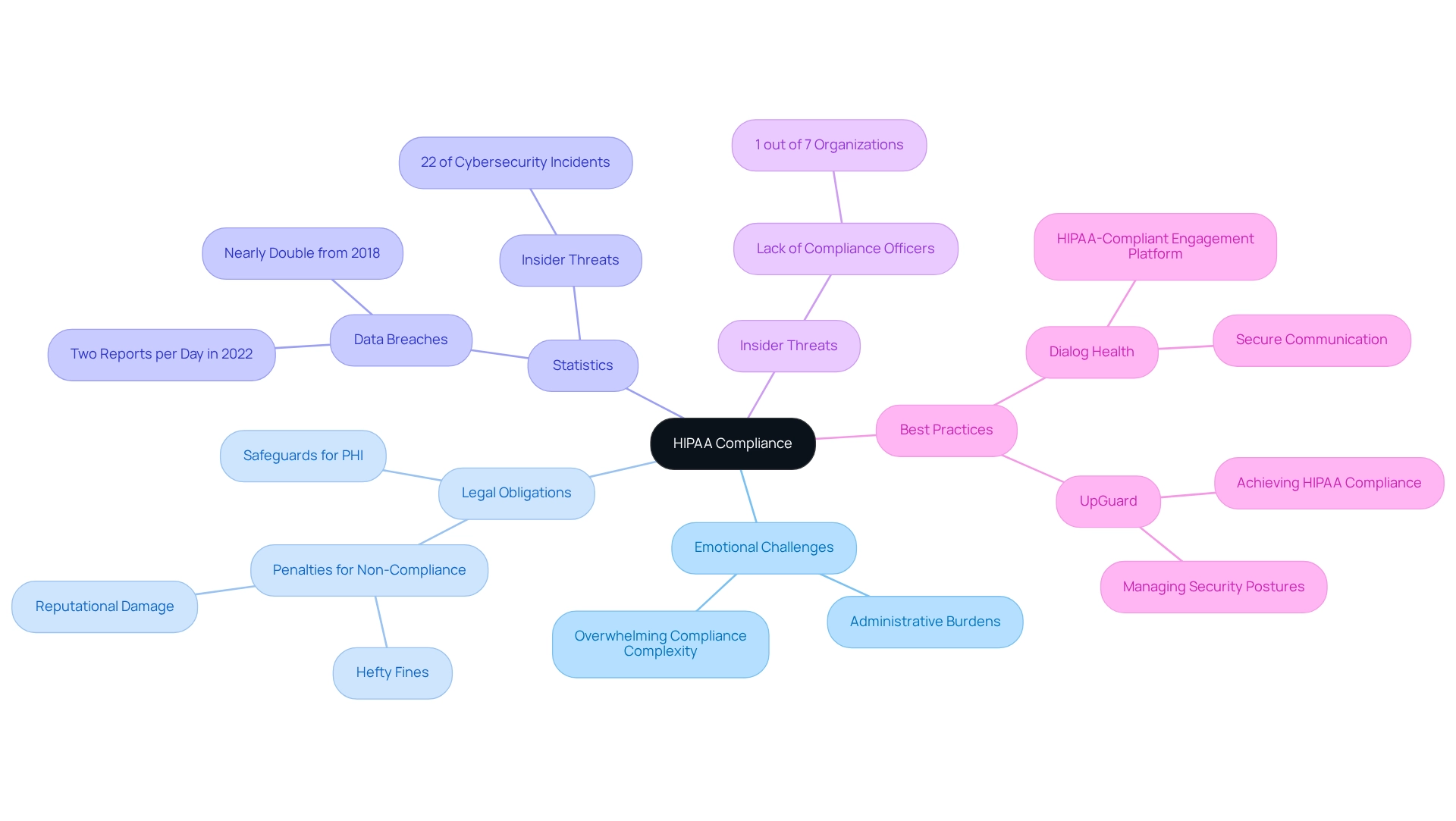
Key Components of a Business Associate Agreement: What to Include
Navigating the complexities of a BAA business can be daunting for healthcare providers, especially when it comes to ensuring compliance and managing (PHI). A comprehensive baa business must encompass several critical components to effectively address these challenges.
It’s essential to clearly articulate terms such as 'baa business associate' and 'protected health information' to eliminate any ambiguity. As Gil Vidals observes, "A business partner is an individual or entity, other than an employee of a covered entity, who performs certain functions or activities that involve the use or disclosure of PHI on behalf of, or provides services to, a covered entity."
Permitted uses and disclosures in the baa business involve clearly specifying the circumstances under which PHI can be utilized and shared, helping ensure that all parties understand their responsibilities.
- Safeguards: Detailing the security measures that the baa business associate is required to implement for PHI protection aligns with HIPAA regulations and fosters a sense of security.
- Breach Notification: Including explicit provisions for timely notification to the covered entity in the event of a data breach is crucial for maintaining trust and supporting baa business adherence.
- Termination Clause: Defining the conditions under which the baa business agreement can be terminated, particularly in instances of non-compliance, protects the interests of both parties.
In 2025, many entities still face difficulties managing baa business, including ensuring subcontractor adherence and frequently revising agreements to reflect changing regulations. Have you considered how these administrative burdens might impact your ability to provide quality patient care? Statistics indicate that a HIPAA Business Associate Agreement must include definitions, obligations, disclosures, permissible requests, and termination terms essential for baa business. MedStack's baa business serves as a practical example, outlining essential elements that can guide organizations in crafting their own compliant agreements.
As Abhinav Kawade points out, "If the BA works with subcontractors who will access PHI, the agreement must ensure that these subcontractors also comply with HIPAA regulations." By adhering to these key components, medical practitioners can mitigate risks associated with breaches and enhance their overall baa business compliance posture. Regularly reviewing and updating your BAAs ensures they reflect current regulations and best practices, ultimately allowing you to focus more on what truly matters—providing compassionate care to your patients.
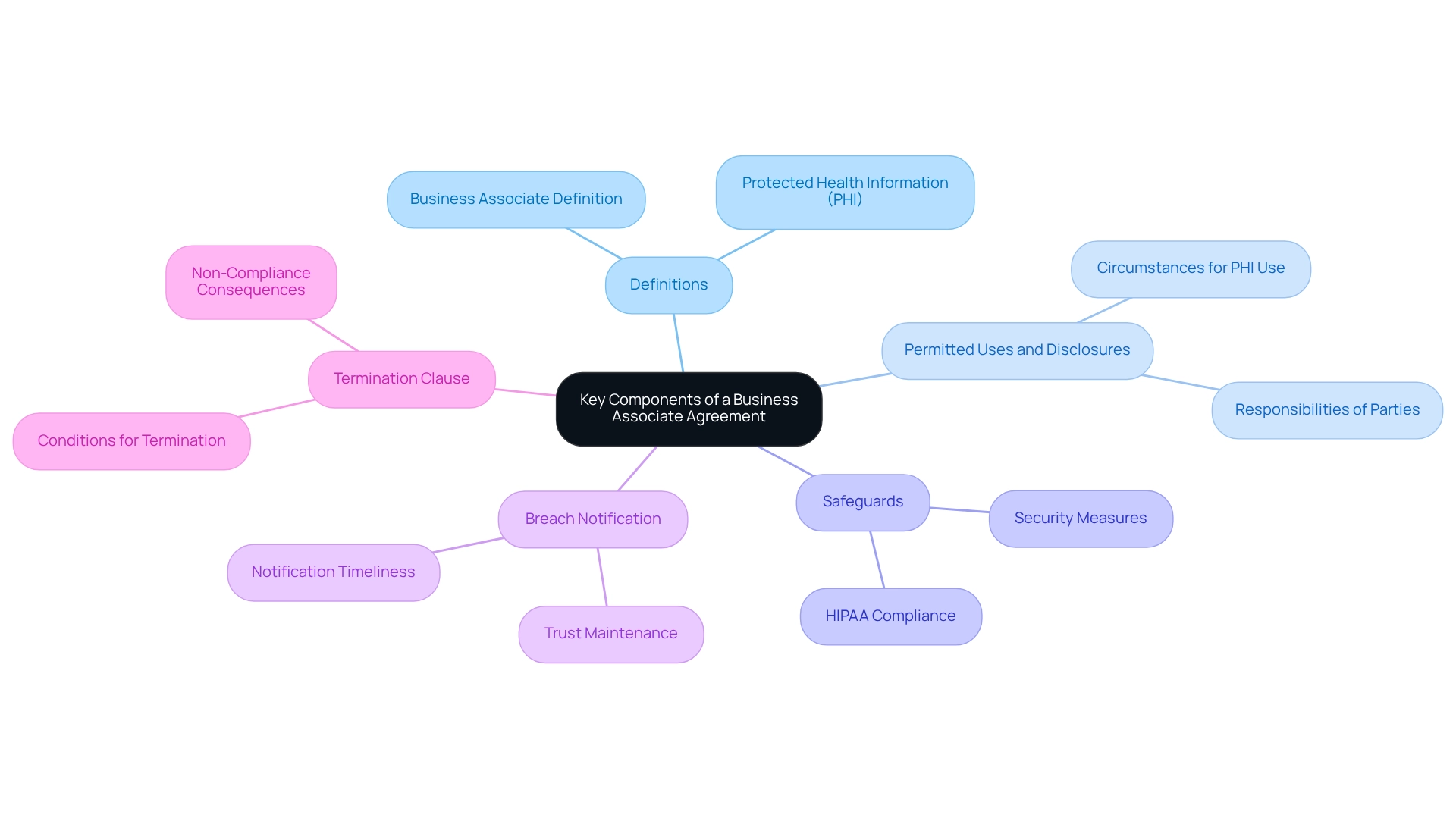
Risks of Non-Compliance: Understanding the Consequences of Missing a BAA
Neglecting to establish a baa business can expose healthcare providers to significant risks that deeply affect their ability to care for patients. Have you considered the emotional and operational challenges that come with this oversight?
- Legal Penalties: Non-compliance with HIPAA regulations can lead to substantial fines, with penalties reaching up to $1.5 million. The recent case involving underscores the importance of notifying consumers about unauthorized disclosures of personal health information, reminding us of the stakes involved.
- Data Breaches: Without a BAA, the risk of unauthorized access to protected health information (PHI) increases. In 2022, medical organizations reported an average of two data breaches per day involving 500 or more records. This statistic highlights the critical need for robust agreements to safeguard patient data and protect the trust that patients place in their providers.
- Loss of Trust: Patients expect their medical practitioners to protect their sensitive information. When this trust is compromised, it can severely damage a provider's reputation, leading to a decline in patient loyalty and potential loss of business. Maintaining patient trust is essential for long-term success in the medical field, and it begins with proper agreements.
- Case Studies: Consider the American Medical Response, which faced a penalty of $115,000 after failing to provide a patient with access to their medical records. This illustrates the tangible consequences of non-compliance with the BAA business requirements and highlights the importance of understanding these obligations.
- Expert Insights: Steve Alder, editor-in-chief, notes, "Although covered entities and business associates have many similar HIPAA compliance obligations, some regulations apply differently to each type of organization." This nuance can lead to significant risks if not properly managed, emphasizing the need for medical professionals to understand their specific obligations.
The consequences of missing a BAA business extend beyond legal penalties; they encompass operational interruptions and increased vulnerability to data breaches. These factors can have lasting effects on a medical professional's ability to deliver quality care, ultimately impacting patient well-being.
In summary, the implications of neglecting to establish a BAA are profound, affecting not only legal standing but also the trust and safety of patient relationships. Healthcare professionals are encouraged to assess their current BAA status and seek guidance from regulatory experts. By taking these steps, you can ensure that you are sufficiently safeguarded, allowing you to focus on what truly matters—providing compassionate care to your patients.
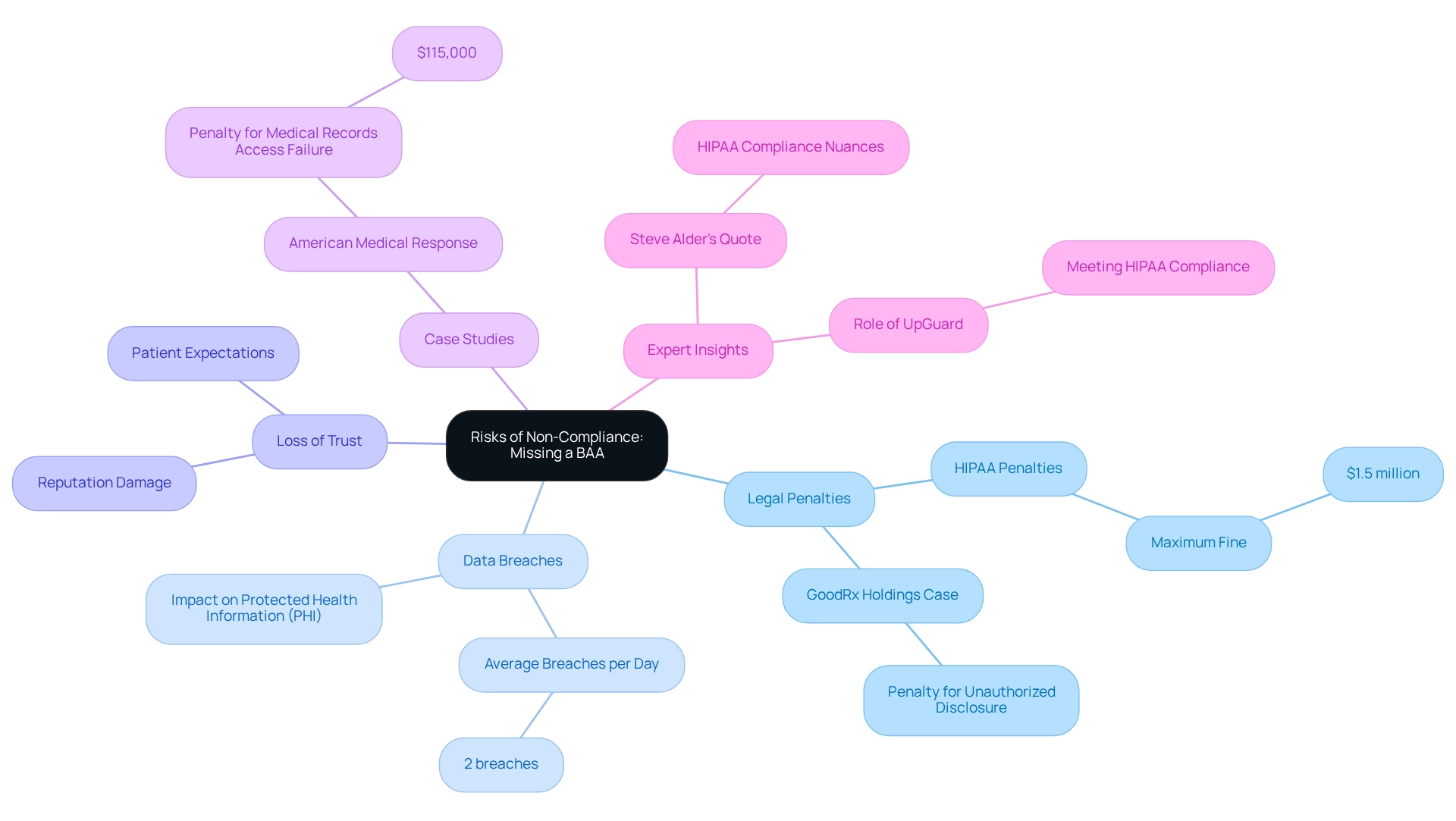
Monitoring and Enforcing BAAs: Best Practices for Healthcare Providers
To effectively monitor and enforce baa business agreements, healthcare providers can adopt several best practices that not only enhance compliance but also alleviate some of the burdens they face.
- Conduct Regular Audits: Periodic reviews of BAAs and the practices of business associates are essential for ensuring compliance. Regular audits help identify potential gaps and reinforce accountability, ultimately enhancing the integrity of the agreements. It’s important to note that 27% of security and IT experts identified alleviating internal audit fatigue as a primary challenge for regulatory programs, underscoring the significance of these audits.
- Establish Clear Communication: Maintaining open lines of communication with business associates is crucial. This means discussing regulatory expectations, sharing updates, and addressing any concerns swiftly. Effective communication nurtures a cooperative atmosphere that supports adherence initiatives.
- Provide Training: Training staff on the significance of BAAs and the specific requirements outlined in these agreements is vital. When staff are well-trained, they are better prepared to identify regulatory issues and understand their responsibilities in maintaining the baa business agreements. Given that 74% of breaches involve human elements like errors or misuse of credentials, this training becomes essential.
- Implement Monitoring Mechanisms: Utilize technology and tools to monitor adherence continuously. Automated systems can track compliance with BAA terms, flagging any deviations for immediate attention.
- Encourage Whistleblower Reporting: Establish a culture that promotes internal reporting of regulatory issues. With 91% of whistleblower tips reported internally, fostering an environment where employees feel secure to express concerns can greatly enhance oversight.
- Leverage Audit Effectiveness: Statistics indicate that effective audits can significantly enhance BAA adherence. Consistently evaluating audit results aids in improving adherence strategies and highlights the importance of following BAAs.
- Address Regulatory Obstacles: Identify and tackle common barriers to adherence, such as lack of knowledgeable personnel and inadequate resources. A case study titled "Obstacles to Adherence Confidence" identifies these factors as primary barriers to adherence teams' confidence. By investing in training and resources, healthcare organizations can strengthen their adherence programs and cultivate a culture of accountability. Furthermore, 76% of risk and regulatory professionals indicated that ensuring their organization develops and upholds was a priority, highlighting the necessity for a robust ethical foundation.
By applying these best practices, medical professionals can enhance their monitoring and enforcement of baa business, ensuring adherence and safeguarding sensitive patient information. Together, we can create a more secure and compliant healthcare environment.
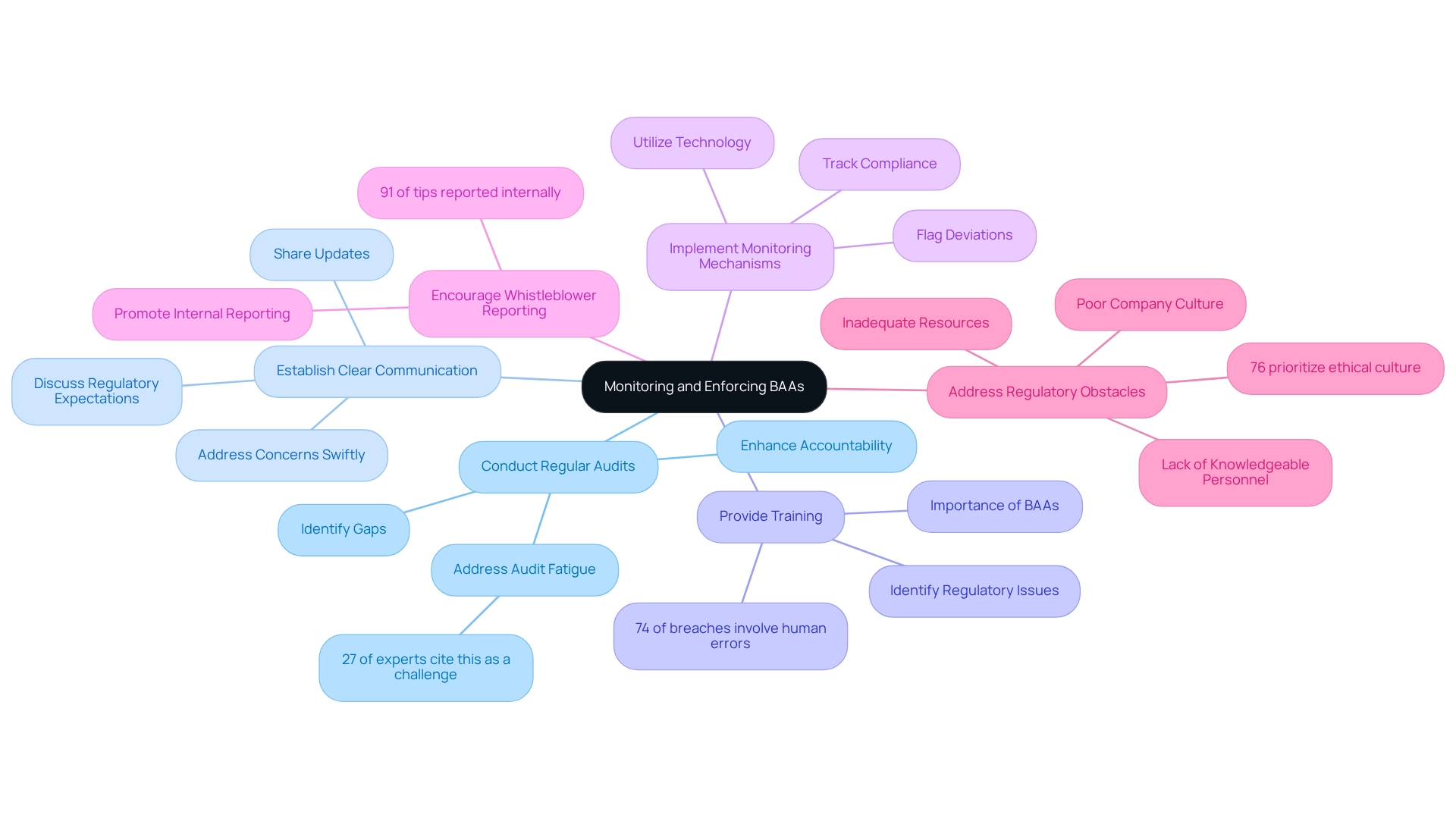
Negotiating Business Associate Agreements: Strategies for Healthcare Providers
Negotiating baa business Associate Agreements (BAAs) can be a daunting task for healthcare providers, often leading to feelings of overwhelm. To support you in this process, it’s essential to adopt several key strategies that ensure compliance while protecting your interests.
- Be Clear About Expectations: Clearly defining the roles and responsibilities of both parties within the agreement is crucial. This clarity helps prevent misunderstandings and ensures that all regulatory obligations are met.
- Negotiate Conditions: It’s important to discuss terms that may not align with your entity’s regulatory requirements. Tailoring the agreement to fit your specific operational needs can significantly enhance its effectiveness.
- Seek Legal Counsel: Engaging legal experts early in the negotiation process can provide invaluable support. Their expertise ensures that the baa business adheres to all necessary regulations and protects your organization from potential liabilities.
- Understand Common Challenges: Many healthcare professionals encounter negotiation difficulties, such as unclear compliance obligations and inadequate risk management strategies. A survey revealed that 60% of practitioners lack confidence in passing HIPAA audits, underscoring the importance of robust negotiation practices.
- Set Realistic Expectations: Establishing achievable goals for the negotiation process is vital. Recognizing the limitations of what can be negotiated and being open to compromise can lead to more productive discussions.
- Utilize Expert Opinions: Drawing on insights from industry experts can enhance your negotiation tactics. For instance, Kathy Lonowski, a former FDIC regulator, emphasizes that is essential for long-term success in navigating BAAs.
- Learn from Case Studies: Analyzing successful BAA negotiations within the healthcare sector can provide valuable lessons. Organizations that diligently document their compliance—34% of establishments—have reported improved outcomes and reduced risk of penalties. The situation of GoodRx Holdings Inc., which faced a $1.5 million penalty for failing to inform consumers about unlawful disclosures, serves as a cautionary tale about the consequences of insufficient adherence to baa business practices.
By embracing these strategies, you can enhance your negotiation outcomes for Business Associate Agreements, ensuring compliance and fostering stronger relationships with your business associates. Remember, you are not alone in this journey; with the right approach, you can navigate these challenges effectively.
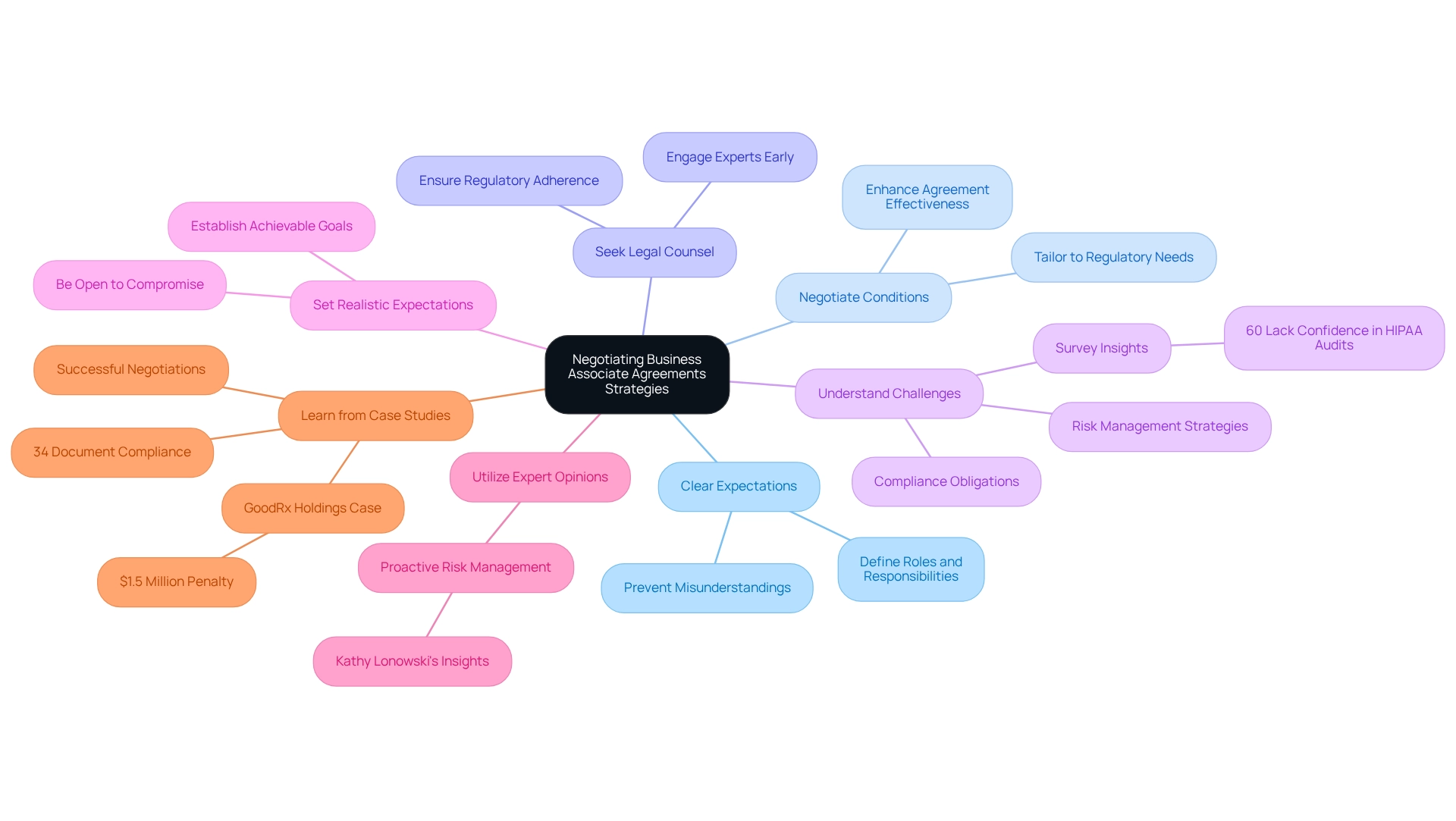
Training Staff on BAA Compliance: Ensuring Organizational Awareness
Training personnel on is vital for fostering a culture of accountability within healthcare organizations. It's essential to recognize the emotional challenges that healthcare providers face, particularly when navigating complex regulations. To effectively implement BAA training, providers should consider the following strategies:
- Conduct Regular Training Sessions: Ongoing training is essential to ensure that all employees grasp the significance of BAAs and their specific responsibilities. Regular updates help reinforce knowledge and adapt to evolving regulations, ultimately easing the administrative burden on staff.
- Utilize Real-World Scenarios: Incorporating case studies, such as adherence to the minimum necessary standard, illustrates the consequences of non-compliance and emphasizes the importance of protecting patient privacy. These examples can significantly enhance understanding and retention of regulatory principles. For instance, following the minimum necessary standard assists organizations in avoiding unnecessary disclosures while ensuring adherence to HIPAA regulations.
- Encourage Questions: Fostering an open environment where staff feel comfortable asking questions about BAAs and regulatory requirements is vital. This method not only clarifies uncertainties but also encourages a proactive attitude towards adherence, nurturing a supportive culture.
Successful baa business training programs in the medical field often include interactive elements, such as role-playing and scenario-based learning, which have been shown to enhance staff engagement and retention of information. Statistics indicate that 54% of regulatory personnel believe AI can enhance adherence efforts and lower expenses, suggesting that incorporating AI into training programs could further boost effectiveness.
- Monitor Adherence Issues: Data shows that a substantial proportion of medical entities face BAA-related adherence challenges due to insufficient training. In fact, 53% of businesses leave over 1,000 files with sensitive data accessible to all employees, regardless of authorization. By tracking these incidents, entities can identify gaps in knowledge and adjust training accordingly, ensuring that staff feel supported and informed.
- Utilize Expert Insights: Involving regulatory specialists to share perspectives on promoting a culture of adherence can offer valuable viewpoints and strategies customized to the distinct challenges encountered by healthcare providers. As Steve Alder, Editor-in-Chief of The HIPAA Journal, observes, "While covered entities and business associates share numerous similar HIPAA regulations, certain rules are applicable in distinct ways to each category of entity."
- Evaluate Training Effectiveness: Using technology to measure training effectiveness can assist companies in improving their programs and ensuring they meet regulatory standards. By addressing the data showing that a substantial portion of medical facilities encounter adherence problems related to baa business due to insufficient training, entities can offer a clear justification for the need for continuous training, reinforcing the importance of a compassionate approach to staff development.
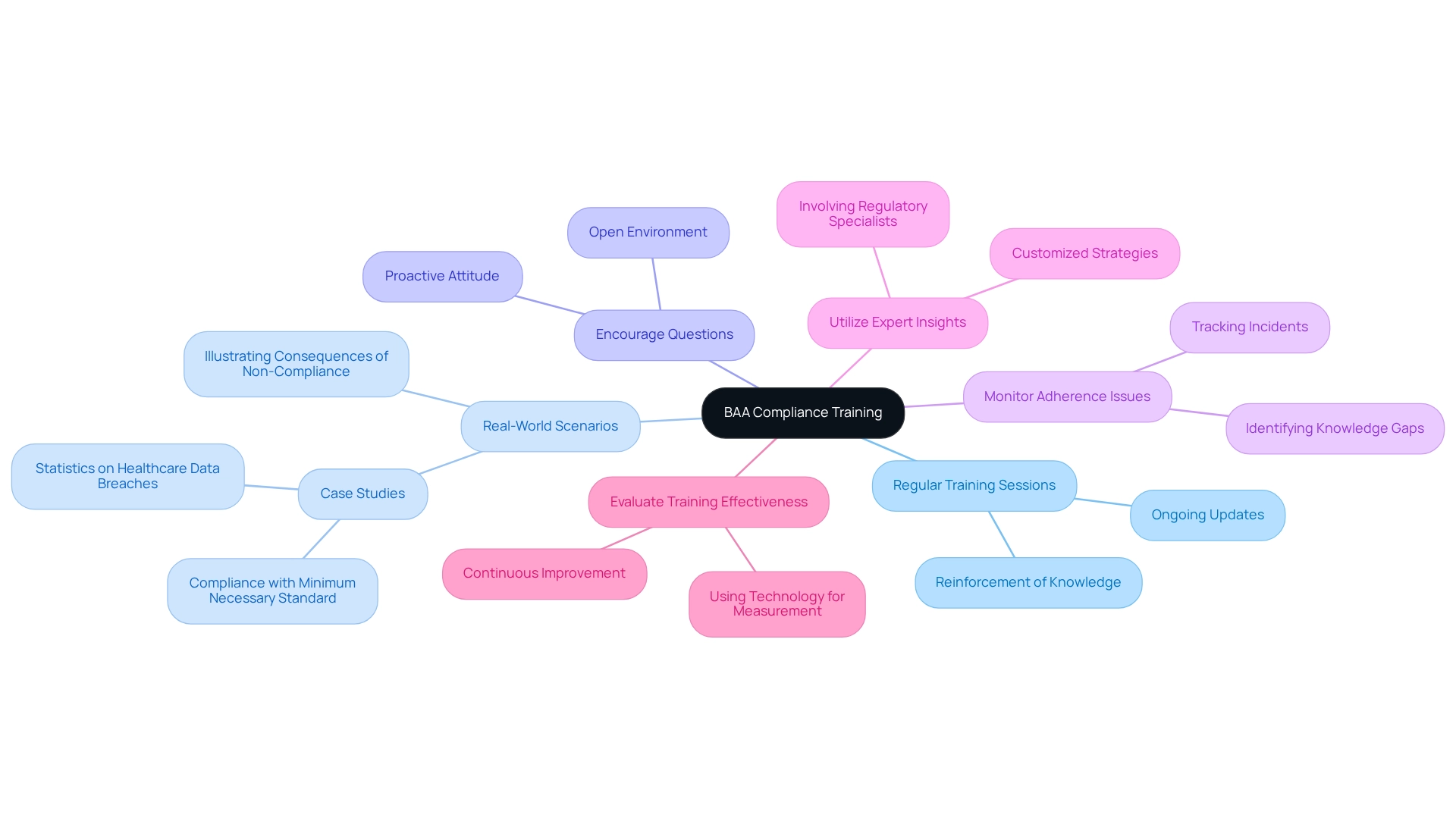
Leveraging Technology for BAA Management: The Role of AI Solutions
In today's healthcare landscape, providers often grapple with the emotional burden of managing BAA business agreements. These challenges can detract from their primary mission: delivering high-quality patient care. However, leveraging technology, , offers a compassionate path forward that can significantly enhance BAA business management. This proactive approach not only reduces risks linked to non-adherence but also ensures alignment with ethical standards rooted in Catholic teachings.
- Streamline Documentation: Picture AI-driven platforms that enable secure management and storage of BAA documentation. By guaranteeing that all records are easily accessible and organized, these tools are essential for audits and regulatory checks. Automating tasks like appointment scheduling and medical record management alleviates the burden of time-consuming administrative work, allowing healthcare providers to focus more on what truly matters: their patients.
- Enhance Reporting: Consider the power of AI analytics that can produce detailed reports on adherence status. This capability enables healthcare entities to identify areas for improvement and make informed, data-driven decisions. In a time when transparency and trust are paramount, this ability is crucial for fostering confidence in operations, particularly in BAA business, where the incorporation of AI in BAA management not only streamlines administrative duties but also aligns with the growing trend of smart automation in the medical field. Yet, a recent report highlights that while AI adoption is on the rise, trust and transparency remain significant obstacles. This underscores the importance of ethical considerations in technology deployment.
As organizations navigate the complexities of regulations, they must remain alert and flexible. Staying in sync with technological advancements is essential for developing effective regulatory programs. By embracing AI solutions, medical practitioners can enhance their BAA business management while also improving overall job satisfaction among employees. This shift allows them to focus more on patient care rather than administrative burdens. Case studies demonstrate that AI can effectively reduce repetitive tasks, leading to a more engaged and satisfied workforce.
To begin incorporating AI solutions into BAA management procedures, providers are encouraged to evaluate their existing workflows. Identifying areas where automation can alleviate administrative loads while upholding ethical standards is a crucial step forward. How might embracing these technologies transform your practice and enhance the care you provide? The journey toward a more efficient and compassionate healthcare environment starts with understanding and addressing these challenges together.
The Future of Business Associate Agreements: Adapting to Evolving Regulations in Healthcare
As medical regulations evolve, healthcare providers face the emotional challenge of ensuring compliance while maintaining patient care standards. The baa business requires that (BAAs) adapt to uphold these standards and mitigate risks. Here are some supportive steps to consider:
- Stay Informed: It's essential to regularly review updates to HIPAA and other relevant regulations. This diligence ensures that baa business remains compliant. Did you know that in 2022, medical entities reported an average of two data breaches per day involving 500 or more records? This statistic underscores the critical need for vigilance in compliance with baa business agreements and highlights the importance of being ready to revise BAAs to reflect new legal requirements and best practices. Integrating clear anti-retaliation policies and training on internal reporting systems is vital. Case studies have shown that entities promoting trust and accountability by safeguarding whistleblowers foster a positive workplace culture, which is crucial for upholding standards.
- Engage in Continuous Learning: Encourage ongoing education for your staff about changes in regulations and their implications for BAA management. With only 35% of healthcare organizations testing their disaster recovery plans annually (HIMSS), continuous learning is not just beneficial—it's essential for ensuring preparedness and compliance.
By proactively addressing these areas, healthcare providers can enhance their compliance posture and navigate the complexities of evolving regulations surrounding BAAs with confidence and care.
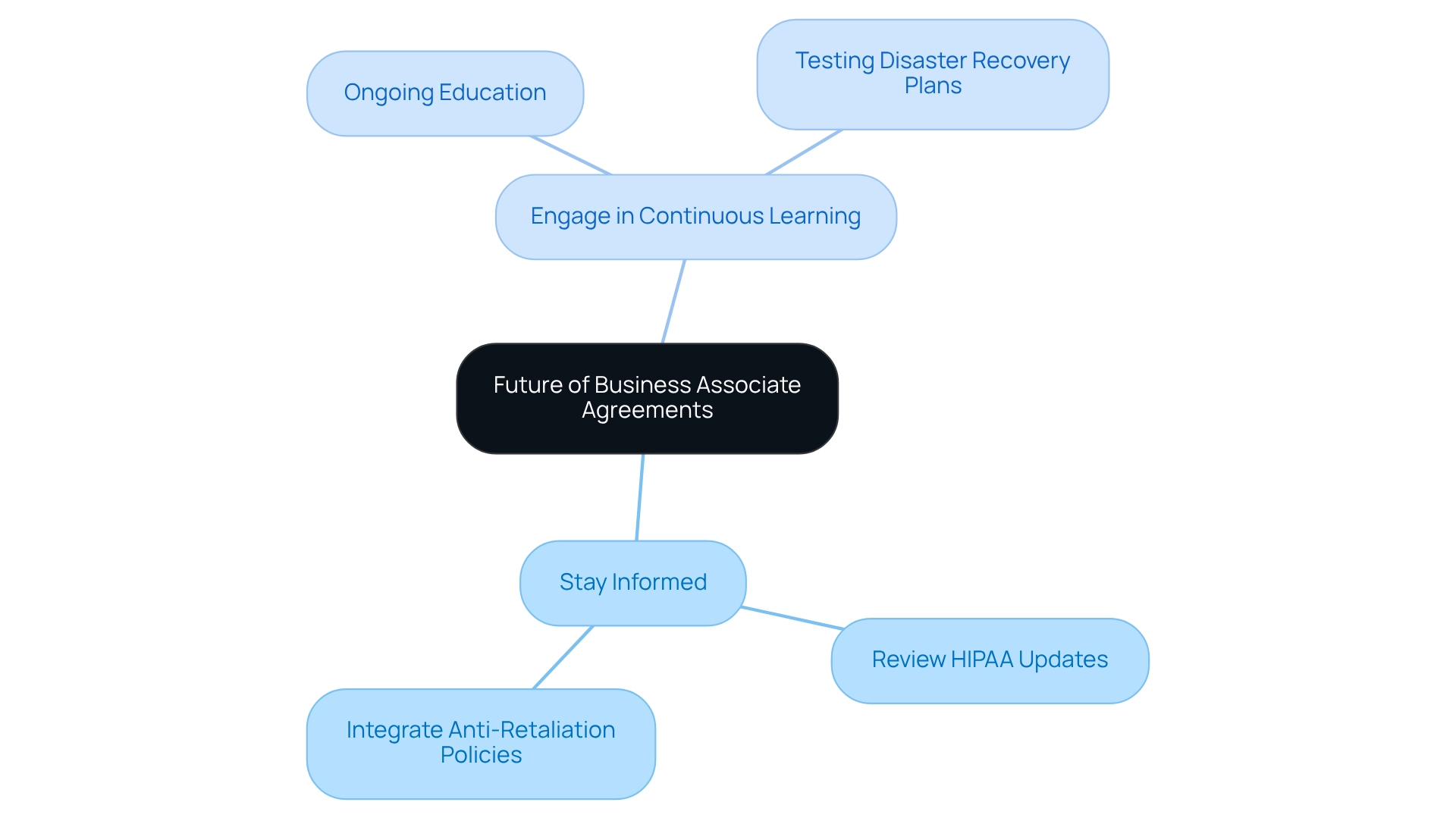
Conclusion
The integration of Business Associate Agreements (BAAs) into healthcare practices is not just a regulatory necessity; it is a fundamental pillar of trust and operational efficiency. Many healthcare providers face emotional challenges as they navigate the complexities of compliance and patient care. This article highlights the critical role BAAs play in safeguarding patient information, ensuring compliance with HIPAA regulations, and enhancing the reputation of healthcare providers. By clearly defining responsibilities and expectations, BAAs help mitigate risks associated with data breaches while fostering patient confidence in the handling of their sensitive health information.
Moreover, the significance of robust BAAs extends beyond compliance; they serve as a foundation for operational effectiveness. Imagine how the implementation of AI solutions for managing BAAs can streamline documentation, automate compliance tracking, and enhance reporting capabilities. This allows healthcare providers to concentrate on what truly matters—delivering high-quality patient care. As the healthcare landscape continues to evolve, staying informed about regulatory changes and adapting agreements accordingly will be crucial for maintaining compliance and protecting patient trust.
In conclusion, healthcare providers must prioritize the establishment and management of BAAs as a strategic component of their operations. By investing in training, leveraging technology, and ensuring regular audits, organizations can not only meet legal obligations but also cultivate a culture of accountability and ethical practice. This proactive approach to BAAs will ultimately lead to improved patient outcomes and a more resilient healthcare system. How will you take the next step in enhancing your practice's commitment to patient trust and operational excellence?




